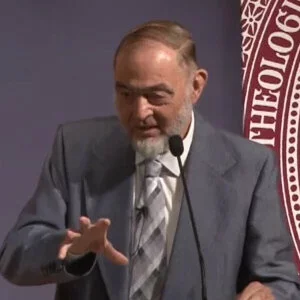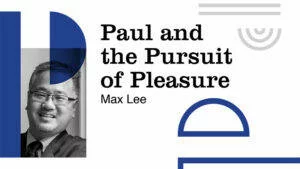When we talk about “translation,” we understand that we have in mind two languages. Translation is to render something originally in one language in the other language. Saying that the Bible teaches a wrong cosmology also implies a difference: a correct version and a wrong version.
Where “accommodation” is invoked the biblical version might not necessarily be wrong, but there might have been a better version. The Bible’s failure to use this better version might be excused by the fact that the Bible was accommodating itself to an audience, which for some reason might not have been in a position to appreciate a better version. Obviously different reasons might be given for why the original audience might not have appreciated a better account. What is crucial is that two ways of expression are implied: the Bible’s way and another way.
Hence we need to examine the other way. Particularly when the topic is cosmology, I believe that it can be stated as a view of the universe that is compatible with a physical view of the world. That does not necessarily mean a view in terms of the latest atomic physics but at least compatible with a physical view. To use a very simple example, the fact that the Bible imagines the universe in terms ofThat leads to a further question: Why does the language of physical detail have superiority over the language of ordinary human experience? an “up” and “down” picture of the world with the heavens above and the underworld below, is seen as an inferior view, because it views the world from the perspective of ordinary non-scientific experience, rather than as a modern cosmologist might. The doctrine of “accommodation” then tries to excuse this deficiency.
That leads to a further question: Why does the language of physical detail have superiority over the language of ordinary human experience? Usually that question is not even asked because it has become an assumed fact that the language of physical science is useful and accurate in a sense that ordinary human language is not. Yet accuracy and usefulness are measured by the uses to which something is put. There are areas in which the language of physical science is not useful, which is proved by the fact that it is not the language we use in ordinary human experience.
Continued probing in this direction will lead to a conclusion about the modern worldview. It is assumed that, behind and underneath the level of ordinary experience, there is a level of greater truth and accuracy. It is not just in regard to cosmology that the Bible does not operate at that level. It is not just in describing the heavens as “up”. Nor is it just in the fact that it does not start its creation account with elementary particles and forces, which are yet to cohere together in larger structures. It is inherent in the fact that the Bible uses the language of ordinary experience.
There is an interesting parallel to this use of human language as the Bible’s means of expression. Its creation account makes man the pinnacle to which creation moves and creation is complete with the original human pair. Certainly there are things that exist and stages before this pinnacle is reached, but they are oriented towards the climax. For example in Genesis 1:14 the heavenly bodies are described in terms of their orientation to human use.
A Thesis
Let us jump out of this laying out of the dimensions of the modern discussion into a thesis. Suppose God, in his creating of a world orientated to man as the pinnacle, created a world where itsIf the test were merely usefulness, then the Bible could be regarded as “useful” for some end or other and no question of being wrong would arise. usefulness for humans was a major factor. For man to use the world required a certain degree of order and regularity in the world and that order needed to exist at various levels and to be comprehensible to humans. However, since functionality was the crucial criterion, it did not need to be exhaustively comprehensible to man.
Here we must distinguish between “true” and “useful.” Any system may be useful for a particular purpose. If the test were merely usefulness, then the Bible could be regarded as “useful” for some end or other and no question of being wrong would arise. “Wrong” however implies that there is a “right” and that right is a physical view. However, the test of the truthfulness of one form of language over another, in the physical view of the universe, is that it is progress towards giving a complete physical description of the universe and its operation.
Why does it have to be a complete description? It is because if it is a useful description for some particular purpose then the same can be said about the Bible and the superiority of the physical view over the biblical is not proved.
It is no use objecting that some preliminary form of more complete physical descriptions are more useful that others for certain purposes. “Useful” is always relative to particular use and is not an absolute criterion of truth. Further, on my alternate thesis that creation was oriented towards man, we would expect usefulness.
From Cosmology to Cosmogony
Just as a biblical use of language that is oriented to human life goes with a creation account oriented to man, so the assumed supremacy of physical descriptions goes with an account of creation oriented to the priority of physical entities. As physical science changed so the physical creation accounts it generated changed. Earlier views of the evolution of the solar system corresponded to earlier theories in mechanics. We have reached today a description of cosmogony that reflects the dominance of the sub-atomic in trying to reach the ultimate physical description
The important point is that each language of reality, biblical or secular physical, implies a creation account. The Bible uses human language because the world was created for man. The belief that the language of physical detail is the ultimate language of truth necessitates creation from the ultimate level of physical reality, even if that is hard for us to express and understand.
Thus, I am not saying that the Bible’s use of human language is an accommodation. I am saying that the Bible’s choice of language reflects something of the nature of reality. It is created reality and further, a reality that was created with men in view.
Testing the Hypotheses
It may be asked how one can present such a “ridiculous” proposition, which goes against the operating consensus of the modern world. The answer is simply that the Bible has always been in that position, though the points at which the conflict is most obvious have differed from age to age. However, once the biblical position is stated, the obvious nature of it throws other positions on the defensive.
How do we know that the present language of physical description presents a complete and accurate description of the ultimate nature of physical reality? That it points to underlying regularities, or that it is useful for some purposes, does not preference a secular physical view over a biblical view. Those are also predictions of the model I am presenting. The crucial difference is that the secular physical model predicts that beneath the surface level of observed complexity,What happens to the search and our whole worldview if, instead of simplicity, we find complexity at deeper levels? and sometimes irregularity, there is a level of absolute rational order. Language in terms of that order is the language of truth.
So far I have been writing in terms of physics, but biology is also involved. When the biblical account of creation was set aside by preference for a more purely physical model, the biological world was a major obstacle. Hence the search for a model of evolution, which involved only physical causes.
Thus, whether we focus on the physical or the biological, the search for the basic order under surface complexity is a major driver of modern intellectual activity. What happens to the search and our whole worldview if, instead of simplicity, we find complexity at deeper levels? Of course it can be asserted that just a little more searching will solve the problem. The problem can be stated in different ways depending on whether we concentrate on the physical or the biological. “Intelligent Design” is an explosive proposition because the level of complexity that emerges at a sub-cell level in biological systems is such that it is hard to conceptualise a physical process that will allow that complexity to evolve, considering that each stage must be viable as a living organism. The concept of “irreducible complexity” does not fit Darwinian evolution with its dependence on only physical causes.
The equivalent problem in the physical area has some analogies, as is brought out in the question “Granted that there was a Big Bang, what was before the Big Bang and why did it happen?” We may make mathematical models of the basic physical order but if those models do not correspond to anything we can conceptualise, where are we? We have postulated a deeper rational order as undergirding our knowledge of the world. What if that order does not exist or remains a hopeful postulate?
Once these questions can be stated as real intellectual dilemmas, then the obvious superiority of a biblical language suited to the ordinary level of human life becomes undeniable. Even if the sub-atomic world revealed a simple order of regular, comprehensible, sub-atoms, the task of understanding all the dynamics up to the level of ordinary human life would be beyond us.
Effectively the justification of human legal and ethical propositions was put on hold while we searched for evidence of the basic rationality of the world.Is the biblical cosmology, which sees normal human life as the basic level, wrong? Not only is it not wrong, it is the only possible one. It was hoped that, with that understanding, a rational ethics could be developed. We are not there yet. What is worse: we may never be there.
Even then, suppose we reached the point where we could explain everything in terms of physical forces. We might reach the objective but at the expense of revealing that all human emotions, decisions, morals, beliefs and so on are a result of the concatenation of factors beyond our understanding. We searched for what was more basic than man and revealed an abyss into which all certainty falls.
I suggest that the search for the ultimate physical order and the presentation of the language of an order, which was unprovable, as the basic language of truth had a consequence. It hides the failure of the non-Christian approach to life to cope at the level of ordinary human life.
Is the biblical cosmology, which sees normal human life as the basic level, wrong? Not only is it not wrong, it is the only possible one.
Appendix
It is often stated that the Bible exhibits a “primitive” cosmology of a three-storey universe: heaven, earth and underworld. Commonly the existence of such a view is “proved” by reference to the Babylonian Creation Epic where the god Marduk creates heaven and earth by splitting his opponent into two parts like a shellfish. However, why deduce the “common” ancient view of cosmology from this text and not from the Hurro-Hittite Song of Ullikummi where the world rests upon a giant figure, who it seems is totally immersed in the sea? Why not base it on The Babylonian Gilgamesh Epic, which seems to describe how the hero, by travelling through the tunnel the sun uses to access the world, comes to a strange world, goes to the sea shore, crosses waters including the waters of death, and arrives at another land, and then to compound the problems, sails from that land to his own land. To what physical model does that correspond?
In reality we impose our expectations on another culture. Since a physical, geometric, model of the world is important to us, it must be what every culture sought. We choose one text to cite because it can be made, by selective quotation, to appear to conform to that expectation. We ignore the rest of that text and other texts, which become ludicrous when pressed into that mold.







Comments
Be the first one to make a comment!